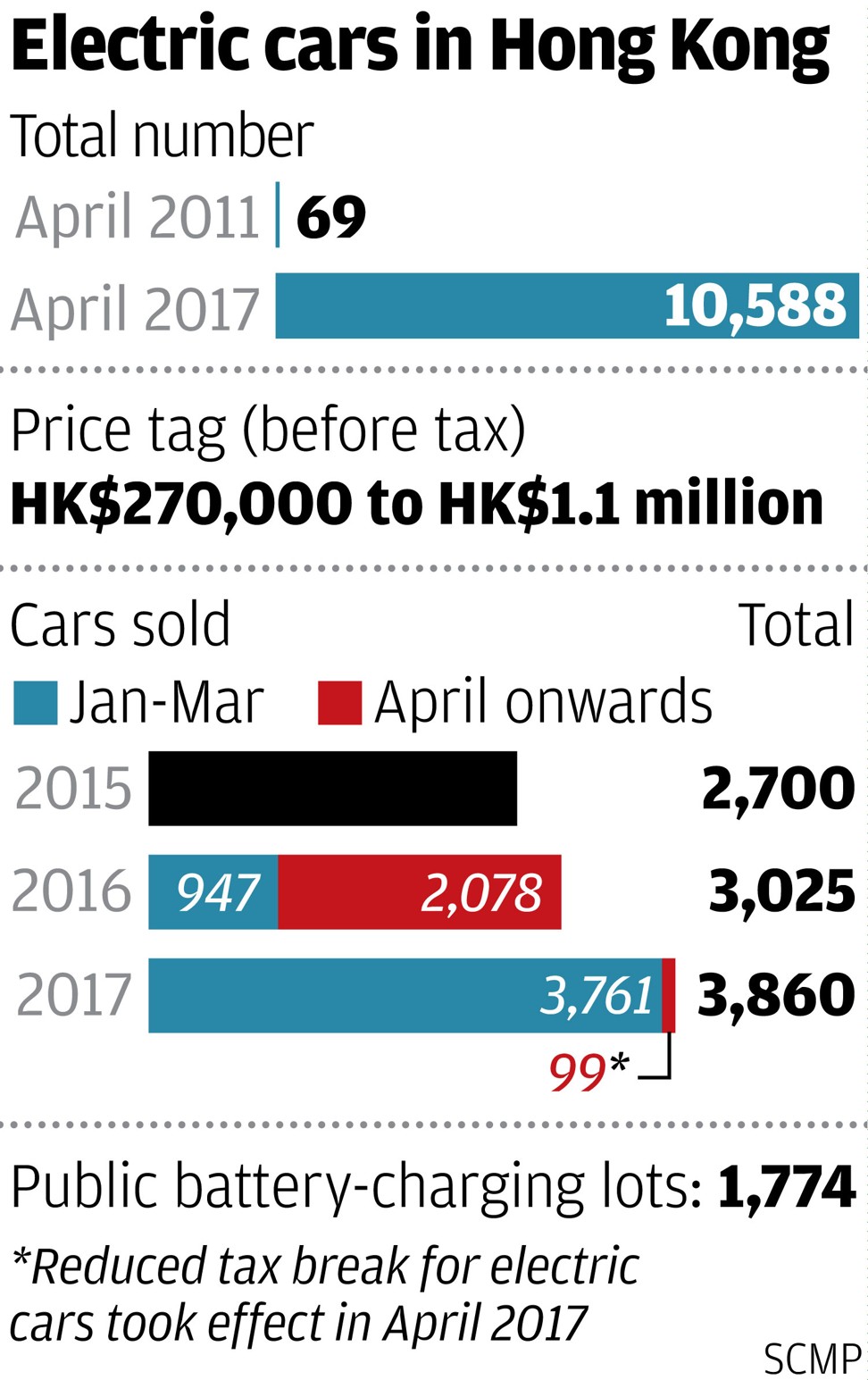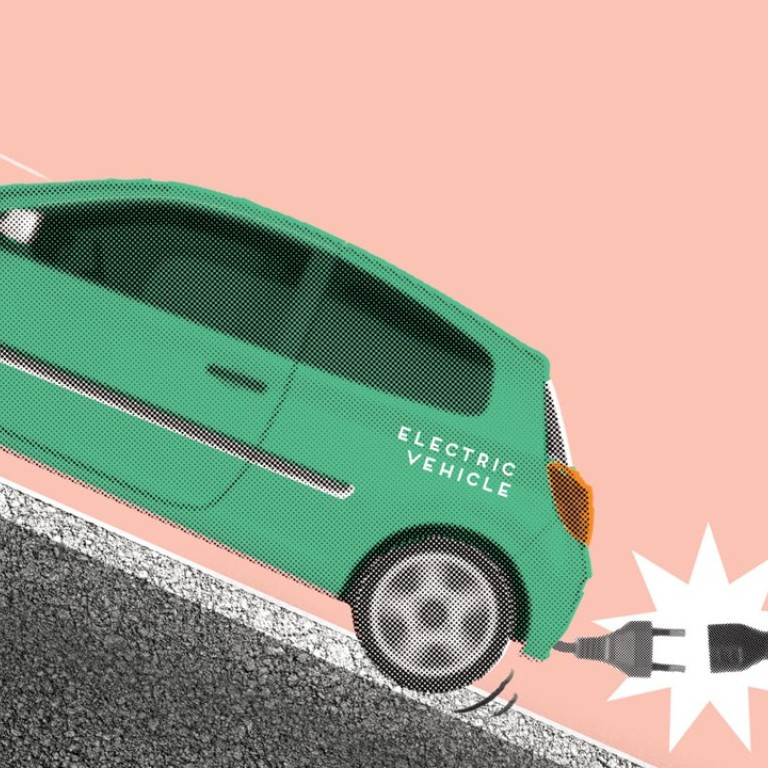
Has Hong Kong pulled the plug on electric cars?
Advocates of zero-emissions vehicles want the government to resume tax breaks and support electric car growth, saying failure to do so would crush smart city ambitions and efforts to reduce air pollution
Chan – who chairs a steering committee on the promotion of electric vehicles – said the surge in the city’s vehicle count and the “increasing acceptance” of battery-powered cars had prompted the government to overturn the tax exemption on electric cars for private use.
Launched in 1994 to encourage residents to switch to greener modes of transport, the exemption fuelled the growth in the number of electric cars in the city – from 69 in April 2011 to 10,588 in April last year, out of a total 590,000 cars.
While capping the tax break for cars at HK$97,500, Chan kept the full waiver for other electric vehicles (EVs) such as light buses and motorbikes. And despite his nod to keeping a lid on the total number of vehicles on the road, there was no corresponding initiative to stem the growth of petrol and diesel cars.
As the city’s vehicle registration taxes start at 40 per cent of the first HK$150,000 of the vehicle’s taxable value, buyers opting for a battery-powered Mercedes E200 at HK$600,000 faced a registration levy of about HK$400,000, or an additional two-thirds of the purchase price.
Mark Webb-Johnson, chairman of Charged Hong Kong – which promotes EVs as a way to improve the city’s air quality – said the group thought the move was “crazy”.
“It’s blindingly obvious. If you reduce concessions, people would just switch back to buying petrol cars,” he said.
And that is exactly what people around him did, he said, asking: “Why did the government kill electric cars?”
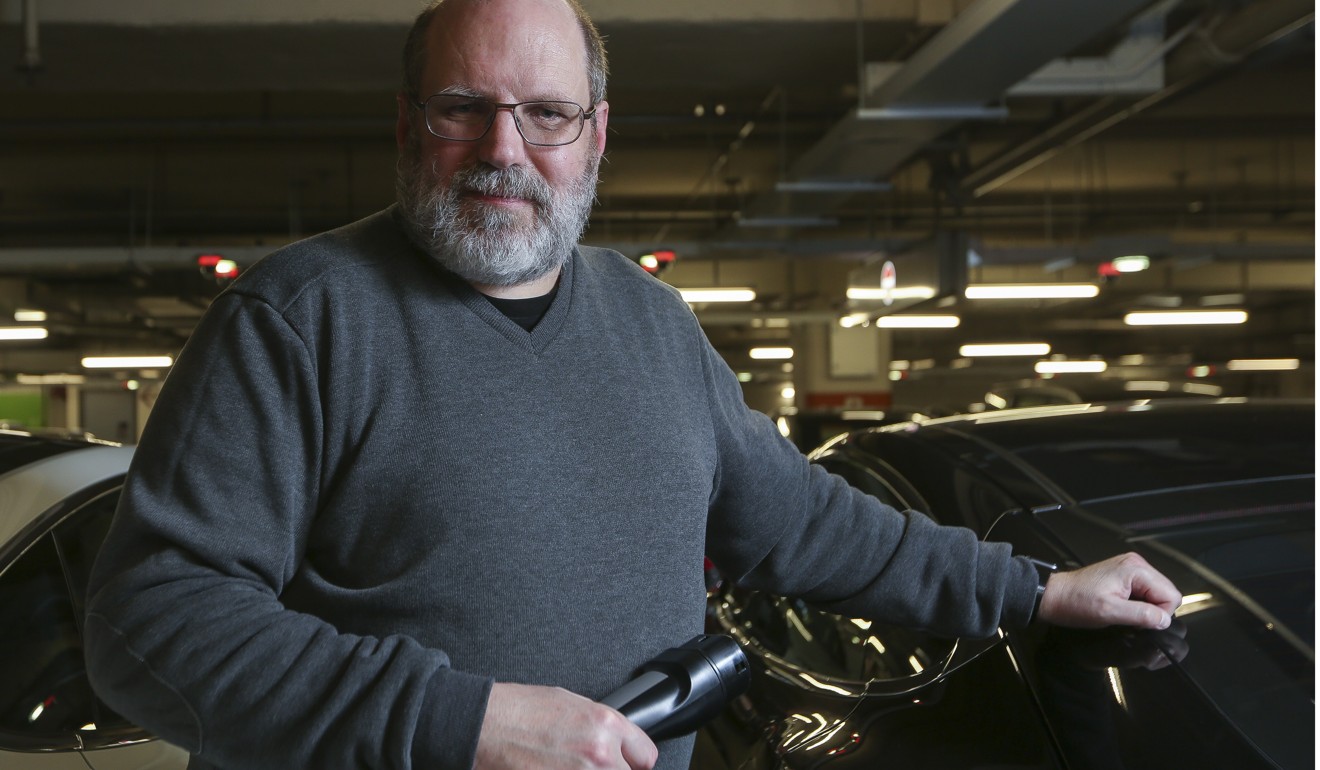
A chilling effect
Sales of electric cars, which are more expensive than regular cars and often have long charging times, collapsed after Chan’s tax change. Only 99 battery-powered private cars were sold in Hong Kong from April to December last year, compared with 2,078 in the same period the year before.
A car industry source blamed big carmakers. In the run-up to last year’s budget announcement, they urged the government to remove the full tax waiver because they felt threatened by the rapid growth of EVs in the city, especially Teslas, the source said.
And it turned out the big makers were the biggest beneficiaries of the policy change.
From April to December last year, petrol and diesel car sales rose by 4.3 per cent to 30,764 from the previous year. German carmaker Audi said there were 2,750 deliveries of Audi cars in Hong Kong last year, up 11.5 per cent from 2016, while Mercedes-Benz sold 480 new cars last November, compared with 373 cars eight months earlier in March.
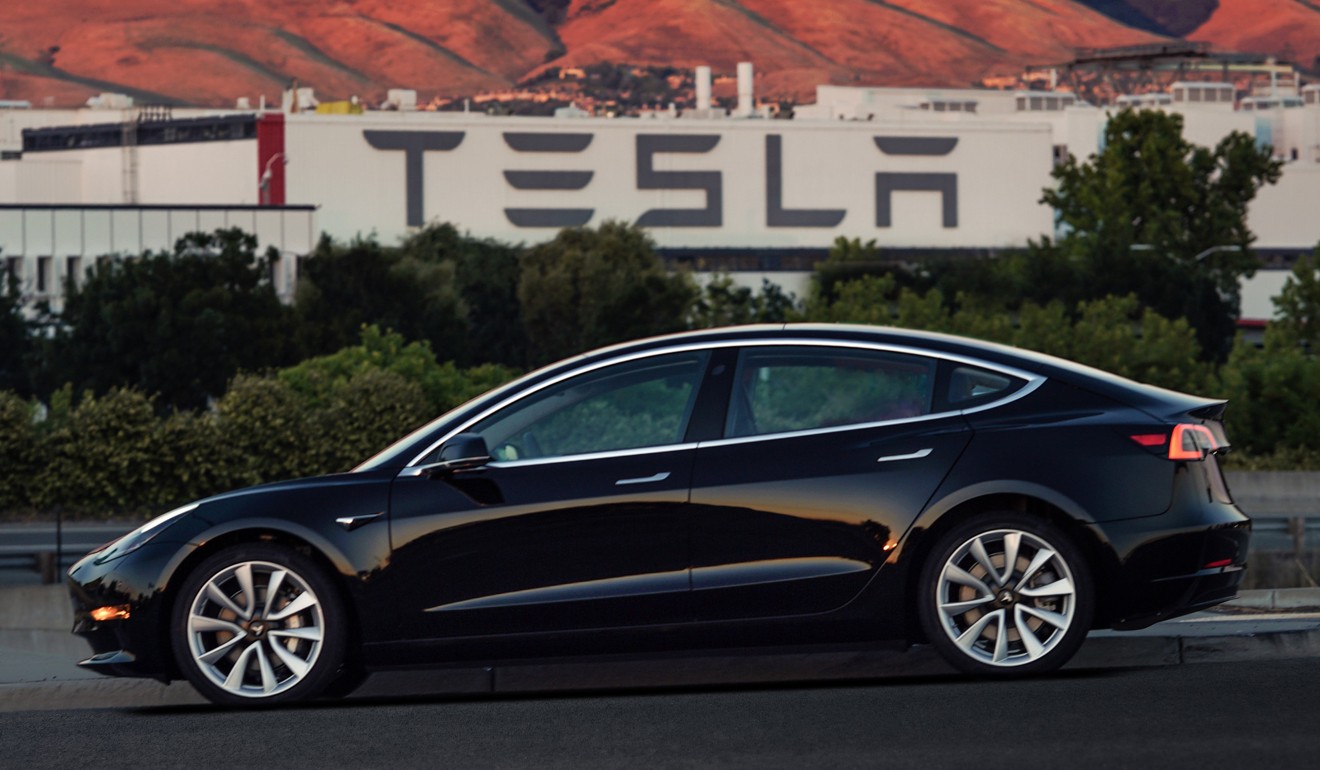
Diesel cars, which are more polluting than petrol cars, also seemed to get more popular. Between May and November last year, 3,075 diesel cars were registered, compared with 1,358 in the same period the year before.
Webb-Johnson, who was born in Hong Kong, said he was especially angry at how this development could affect public health.
This Chinese battery maker will soon surpass Tesla in capacity
Hongkongers last year endured 44 days of high-risk air, filled with harmful quantities of nitrogen oxide and respirable suspended particulates known as PM10 – almost double the number for 2016 – according to government data.
Air pollution is thought to cause five premature deaths per day in the city, and contribute to the deaths of about 20,000 Hongkongers per year.
Carelessly made decisions?
In his 2009-10 policy address, former chief executive Donald Tsang Yam-kuen set out an aim for Hong Kong to be one of the Asian cities where electric vehicles were most widely used.
In May 2011, a government planning paper suggested that by 2020, it aimed for 30 per cent of cars on the road to be e-cars or hybrid models – which have a conventional engine using fuel and an electric engine powered by a battery – with 30 per cent of private car parking spaces in new buildings having charging facilities.
But in a response to a lawmaker who asked about the figure in April 2016, the environment minister clarified that the government had not set any e-car targets. Rather, the figure was an assumption made by a consultant as part of a study on reducing emissions in the city.
Last week, in response to queries from the Post, a government spokesman, once again referring to the 30 per cent figure for e-cars as an “assumption”, said: “With hindsight, including this assumption [in Chapter 8 of the Hong Kong Planning Standards and Guidelines] might have been over-optimistic.”
The spokesman added: “The fact is that Hong Kong is a free market. The government’s policy on promoting electric vehicles is mainly to encourage and facilitate market development.
“The actual number of electric vehicles in Hong Kong depends on local conditions, technology developments, vehicle price, and the availability of suitable models on the market, etc.”
But Ingrid Yung, vice-chairman of another e-car owners’ group Electrify Hong Kong, questioned the government’s commitment to renewable energy sources and green practices.
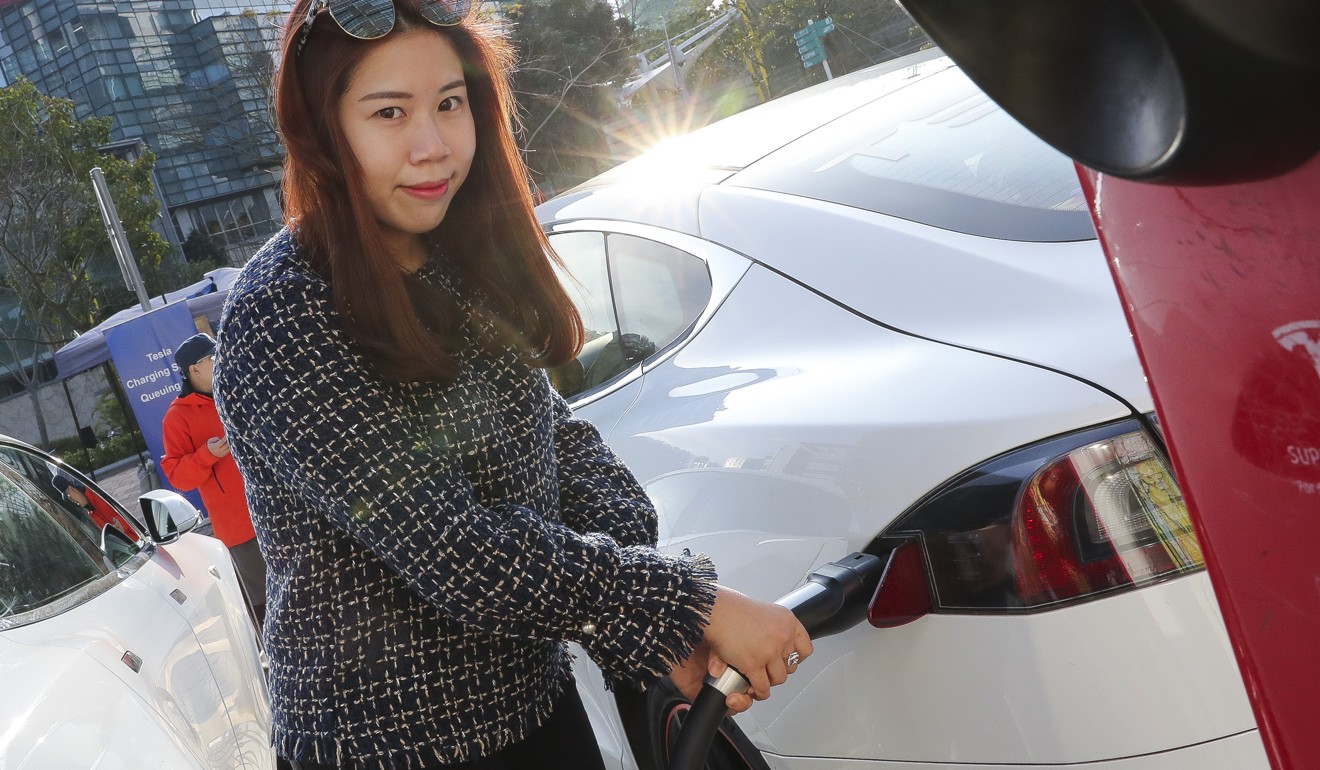
Last January, in light of the Paris agreement by countries to slow climate change, the city’s government promised to increase renewable energy sources in power generation to 3 to 4 per cent, up from 1 per cent.
“Without the government’s policy support, how can you expect people to embrace greener products?” she asked.
Hong Kong American Chamber of Commerce president Tara Joseph added: “We are puzzled and concerned about the policy. [Capping the waiver] was supposed to ease traffic congestion but now we have more cars on the road.
“More importantly, despite the debate on the emission benefits of EVs, fuel-based cars definitely worsen roadside pollution. Now we have both deteriorating air quality and more congestion.”
Globally, more countries are trying to phase out cars powered by fossil fuels and encourage the use of electric cars.
Chinese-backed electric car start-up Byton woos CES with model 40pc cheaper than a Tesla
Norway said it would only allow sales of cars that are 100 per cent electric by 2025, supporting the move with a green tax system that imposes higher charges on users of conventional cars. Beijing’s goal is to have five million new-energy vehicles on the roads by 2020 and it has been offering subsidies to support the manufacture and sale of electric cars and plug-in hybrids.
In Hong Kong’s case, Yung added that the government should also provide more charging facilities for EVs. Currently, there are about 1,774 public charging lots – or one for every six electric vehicles.
But of the 624 public charging lots in government-managed car parks, more than half are slow-speed standard chargers, which take two full days to charge a car, Yung said.
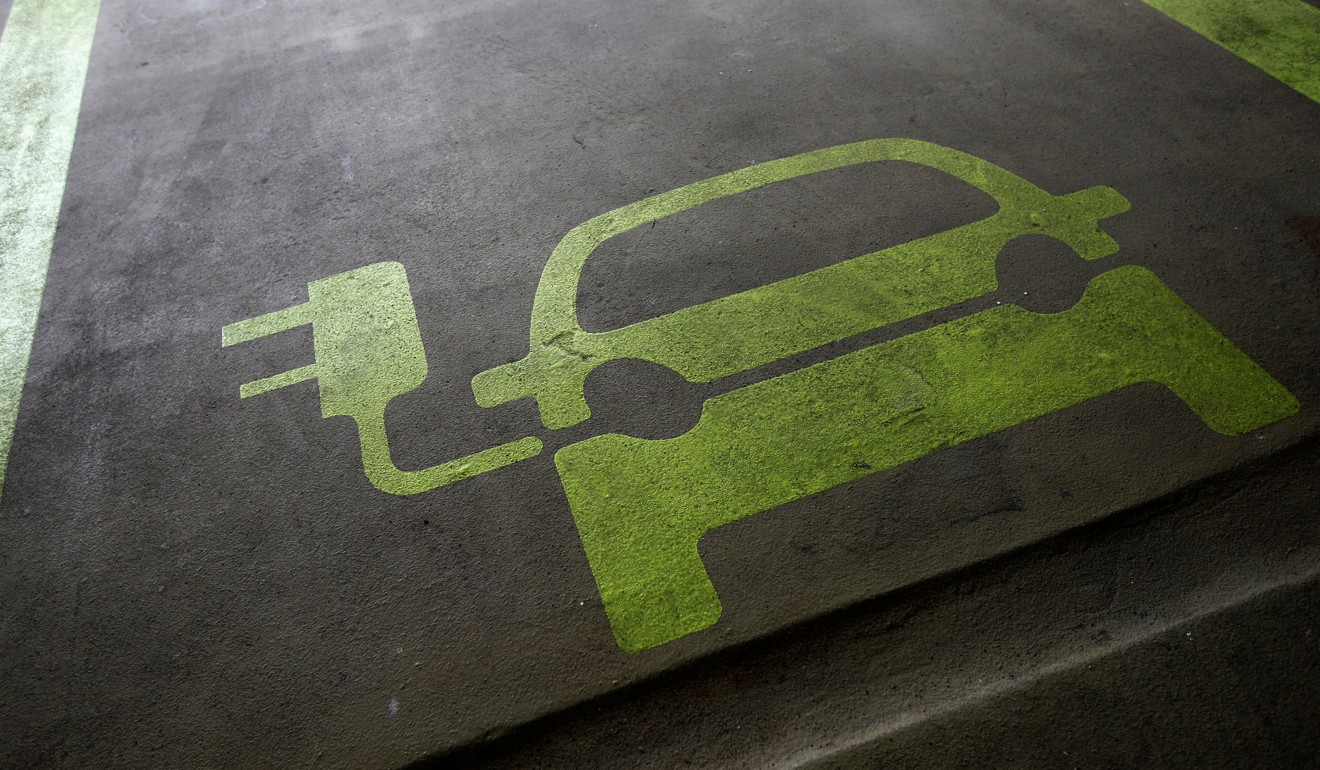
“Worse still, the government car parks do not give electric cars exclusive use of the charging lots. What has resulted most of the time is that the charging spaces are occupied by petrol vehicles,” she added.
Last week, acting environment minister Tse Chin-wan revealed to the Legislative Council that the government had made a misstep with charging facilities in private car parks.
From April 2011 to September last year, the Buildings Department gave concessions to developers of 370 car parks by discounting the gross floor area allocated to EV charging lots from the development’s building plan, meaning developers had extra space to sell to customers.
However, it did not institute basic standards for chargers and a mandatory requirement for the chargers to be connected to the grid. As a result, some spaces were set up with charging facilities but no electricity.
Tse said the government was reviewing its policies.
Not too late for EVs
The government spokesperson said it was assessing EV tax concessions ahead of the budget address later this month and would take into account the latest developments, including public feedback.
Business leaders have already voiced their disappointment, saying last year’s change ran counter to the city’s efforts to be a hub for smart technology.
Other commentators urged the government to reduce the tax burden on owners, noting that Denmark last year decided to reverse an earlier decision to phase out tax breaks for EVs, after electric car sales tanked.
Yung said: “We are not asking for full tax exemptions. But the government can draw a line and say, for instance, for an e-car valued under HK$400,000, buyers can enjoy a full tax waiver. This can be a real incentive for those who can only afford a cheaper e-car.”
Watch: China’s path to electric car supremacy
Webb-Johnson agreed. If the intent was to reduce traffic congestion, there should be a corresponding rise in taxes on fuel cars, he said. Alternatively, why not offer owners of conventional cars a full registration tax waiver if they switch to electric cars, he asked.
However, Polytechnic University’s Professor Eric Cheng Ka-wai pointed out that even if the reduced tax break for electric cars stayed, it could spur the production of cheaper models for the Hong Kong market.
The director of the university’s Power Electronics Research Centre said: “Of course it would be better for the government to increase the tax breaks for electric vehicles. But even if it insists on the cap of HK$97,500, electric car makers could still adjust their production strategies to achieve the maximum benefits.”
He said that based on the current tax regime, buyers of electric cars costing under HK$150,000 would not have to fork out any registration tax.
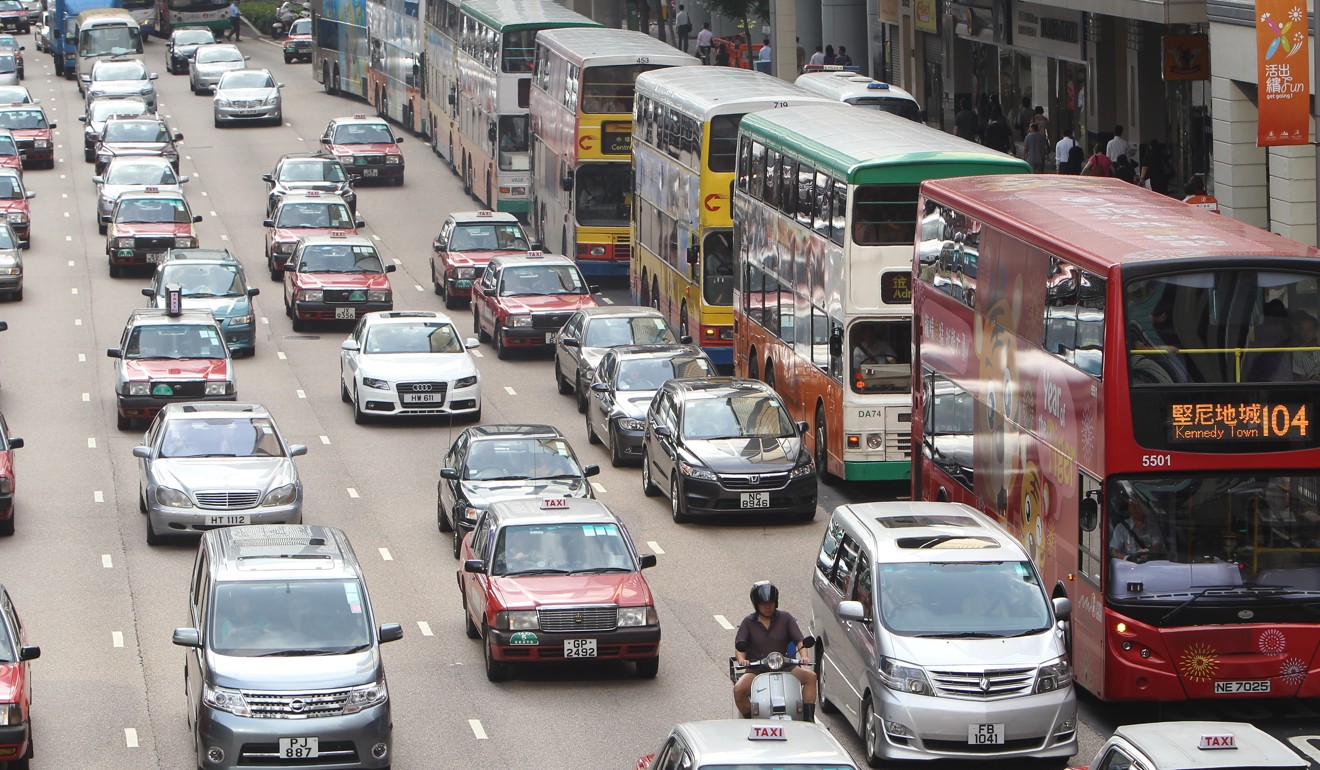
“But at present there are no such cheap EVs available on the market ... this may prompt European car makers to introduce cheaper EVs to Hong Kong and other markets as well,” he said.
Cheng said it was possible to produce cheaper electric cars at the market rate of around HK$150,000 if car makers removed some hi-tech features from EVs such as self-driving technology. Given that global demand for electric cars is still at a nascent stage, most companies working on battery-powered models have tended to target the luxury market.
“If the use of EVs is just aimed at reducing roadside emissions, there is no need to install so many expensive features in the car,” Cheng said. “When EVs can be so cheap, it will speed up the pace of phasing out fuel cars as no one will eye those cars any more.
“But the downside is that it takes at least a few years for car manufacturers to develop cheaper EV models. The EV market in Hong Kong may have to become stagnant for a long while.”
Cheng, an expert on electric cars, recently developed an energy storage device called a Supercapacitor to charge EVs quickly. It has a lifespan of several decades and can fully charge EVs to travel 30km in four minutes.
There needs to be more research devoted to new EV technologies, and training of skilled professionals who can apply the technologies to the real world, he said.
Lastly, he suggested the government introduce a negative tax on EVs as a form of subsidy.
“For example, if in the future there are cheaper EV models, for people who buy EVs priced under HK$150,000, they can be entitled to a negative tax, a form of a tax rebate from the government,” he proposed.


